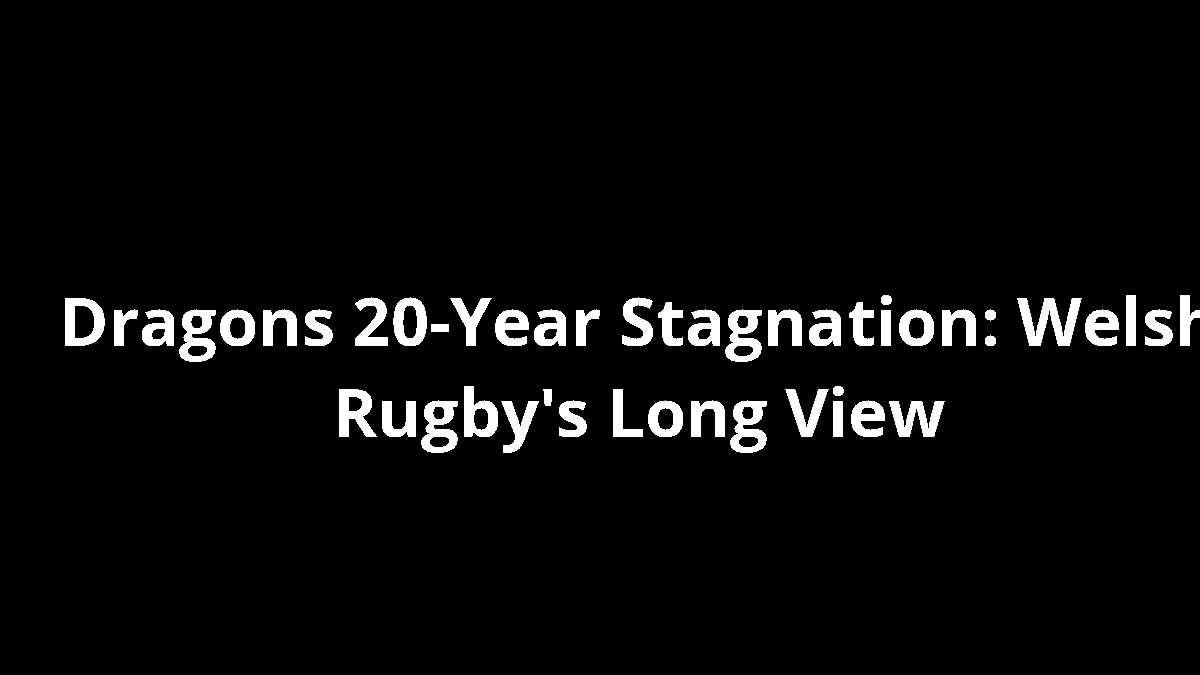Lyn Jones: Dragons Have Worked Hardly Any Progress in 20 Years
Dragons 20-Year Stagnation has become a blunt shorthand for a two-decade arc that many fans debate in pubs, on social media, and in boardrooms. The Dragons 20-Year Stagnation label sticks because it captures the tension between talent depth and sustained success, and because it surfaces whenever the region faces a high-profile fixture. The Dragons 20-Year Stagnation framing is not the final word on potential; rather, it is a prompt to examine coaching longevity, player development pathways, and the constraints of Welsh rugby’s funding model. The Dragons 20-Year Stagnation remains a controversial but enduring motif. For some, it is a symptom of broader structural issues in the sport; for others, a reminder that a team can break out of a cycle with disciplined leadership and smarter recruitment. The Dragons 20-Year Stagnation continues to shape expectations around Rodney Parade’s role in Wales.
Jones’s arguments carry weight because the Dragons 20-Year Stagnation phrase collides with numbers on the ground. The Dragons 20-Year Stagnation label can be found in budget projections, player pathways, and in the tempo of URC fixtures, where a team with loyal support still faces mismatches with bigger regions. For readers seeking context, BBC Sport Rugby has covered the wider debate about Welsh pro teams and potential mergers, and World Rugby‘s governance principles provide a frame for evaluating the URC’s future. Meanwhile, supporters wonder how much of this debate translates into practice on the training pitch and in match preparation. The Rodney Parade derby, looming on the horizon, offers a live test for whether the Dragons 20-Year Stagnation narrative can be rewritten by a run of form or reinforced by ongoing structural questions.
What Jones Means by Stagnation
The core of Jones’s message is simple: progression in Welsh rugby isn’t guaranteed just by assembling talented players. It requires a stable development pathway, smart recruitment, and a clear plan for integrating youngsters into senior competition. In practice, that means a more predictable pipeline from academies to URC squads, better exposure to top European fixtures, and a coaching culture that translates potential into results over multiple seasons. When fans ask why the Dragons have not converted talent into sustained success, they are often pointing to gaps in continuity and governance rather than a lack of individuals who can win matches. The Dragons 20-Year Stagnation term encapsulates that gap, while forcing a clearer look at what systems must change for real improvement.
Dragons Seen as Prime Welsh Pro Team if WRU Cuts Uk Pro Teams
On the surface, the idea that the Dragons could become the leading Welsh pro side if the WRU trims UK-based pro teams rests on a mix of risk, opportunity, and public will. The argument hinges on streamlined resources, a focused player pool, and the ability to compete with a smaller, more cohesive structure in both URC and European competition. Proponents argue that a smaller set-up could lead to higher per-player investment, steadier selection policies, and a sharper regional identity tied to south Wales. Critics warn that shrinking the professional landscape may magnify talent drain and heighten financial pressures in a region that already competes with Cardiff and Ospreys for attention and sponsorship. The debate is as much about values as it is about tactics or transfer markets.
Market and Community Support Matters
- Talent development pipelines must deliver reliable top-tier players.
- Commercial strategies must align with on-field performance to sustain budgets.
- Governance reforms should balance regional pride with global competitiveness.
Supporters note that the Dragons have a loyal base in south Wales, with a strong match-day atmosphere at Rodney Parade. If the WRU considers consolidation as a path to longevity, the Dragons must show that a leaner model can still produce players who compete at European levels and attract global sponsorship. For readers seeking perspectives beyond Wales, reference to international governance debates and financial modeling can be instructive. A case study in this region could offer a blueprint for other nations wrestling with similar headaches around structure and investment. The debate over which Welsh pro team remains core to the country’s rugby future is not just about sport; it is about identity, economy, and long-term strategy.
Rodney Parade Showdown: Dragons vs Cardiff as Jones Voices Long-Term Stagnation
The Rodney Parade fixture is more than a derby; it is a live theatre for the long-running question about Welsh rugby’s organization. Jones frames this match as a litmus test for whether the Dragons can finally disrupt a two-decade pattern of underachievement. In practical terms, a win could signal progression in on-field consistency and a step toward broader structural gains. In contrast, a defeat may reinforce the perception that the Dragons 20-Year Stagnation label remains a barrier to broader improvement. The emotional and strategic energy from the derby compounds discussions about coaching continuity, player development, and the role of a regional system in the URC’s evolving balance. Fans should watch how the teams implement game plans, adjust at halftime, and translate set-piece dominance into scoreboard pressure.
Rodney Parade as a Barometer for Welsh Rugby Strategy
Rodney Parade is not just a venue; it is a microcosm of Welsh rugby’s strategic crossroads. A strong Dragons performance would lend weight to arguments for continued regional investment and against sudden WRU-led mergers. Conversely, a Cardiff victory could intensify calls for reform, especially regarding how regions share resources, coaching staff, and medical support. In this climate, the match gains significance for URC balance, European qualification prospects, and the broader debate about whether Welsh rugby should consolidate or expand. The derby could influence long-term policy discussions, including how the WRU budgets elite programs and how clubs structure their development academies to feed international ambition.
Former Dragons Coach Urges Focus on Welsh Rugby Restructuring Ahead of URC Derby
With a reshuffle on the horizon, former Dragons coaches are urging the sport to address deeper structural questions before the URC derby becomes a mere tactical showcase. They argue that resilience and competitive sustainability will come only when Welsh rugby aligns its regional model with European opportunities and domestic growth. The focus is not simply on one team; it is on creating a system where coaching education, player pathways, and financial planning reinforce each other across the country. The message is clear: restructure with a long-term aim, and the Dragons can be part of a healthier, more balanced Welsh rugby landscape that performs more consistently on the field.
Restructuring Projections and Timelines
Experts emphasize that changes require clear timelines, transparent governance, and buy-in from clubs, players, and fans. While timing remains a political and logistical challenge, the idea of a more cohesive Welsh rugby system is gaining traction in boardrooms and on match days. A planned, staged approach could reduce disruption while delivering measurable gains in talent development, coaching standards, and financial stability. Wales would benefit from a model that prioritizes long-term performance over short-term wins, even if that means temporary frictions as players transition through new pathways. The URC continues to be the proving ground for whether these ideas translate into results on the field.
URC Clash at Rodney Parade: Jones Claims Dragons as Cardiff Rival Highlight of Welsh Rugby Debates
As URC action returns to Rodney Parade, the clash between Dragons and Cardiff is less about bragging rights and more about how Welsh rugby navigates the era of restructuring and consolidation. Jones insists the Dragons are the obvious counterpoint to Cardiff’s established identity, and that the rival derby can spotlight where Welsh rugby stands in a global context. The match is an arena for arguments about competitiveness, player workload, and the economics behind a sustainable regional model. Observers will note how both teams adapt to rotating schedules, how coaches manage player rotation, and how young players capitalize on opportunities in a league that demands both speed and gravelly physicality. The stakes extend beyond the field to the strategic decisions made in governance rooms across Wales.
Debate Over Derby Prestige vs Structural Reform
Supporters of the Dragons argue that a strong, local identity helps attract fans, sponsors, and youth participation, which in turn feeds the broader rugby ecosystem. Critics of a purely derby-driven approach caution that without real structural reform, headline wins will not translate into long-term stability. The URC clash at Rodney Parade thus serves as a focal point for arguments about where Wales places its resources and how it measures success: by trophies next to a balanced player pipeline, or by a broader, sustainable model that prioritizes development and European competitiveness. The conversations around derby prestige intersect with policy considerations, making every scrum and lineout feel like a referendum on Welsh rugby’s future.
Jones: Dragons The Obvious Choice If Wales Reduces Pro Teams
Jones has long argued that a reduced set of professional teams could lead to sharper competition, clearer development paths, and more efficient use of resources. In his view, the Dragons would become the obvious choice if Wales trims the number of pro outfits, provided the region aligns its strategy with a broader national blueprint. The logic rests on concentration of talent, improved coaching ecosystems, and a more sustainable financial model that can withstand European campaigns and changing sponsorship markets. While opponents worry about losing regional voices, Jones contends that a leaner system could magnify the Dragons’ strengths and create a more cohesive, competitive unit capable of challenging the top teams across the URC and in Europe.
Pros and Cons of Consolidation
On the plus side, fewer teams could mean better resource allocation, stronger talent pools, and a more consistent pipeline to the national team. On the downside, there are real fears about losing regional identities and reducing opportunities for players who rely on the current structure to break through. The debate hinges on whether consolidation can deliver long-term stability without eroding the regional cultures that fuel Welsh rugby’s passion. As policymakers assess options, the Dragons’ example will be cited in discussions about how to balance identity, competitiveness, and financial sanity in an increasingly global club landscape.


